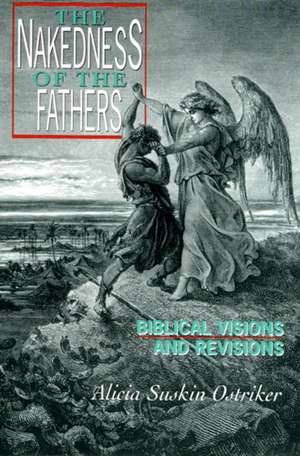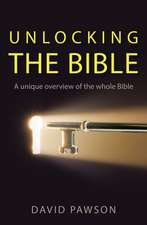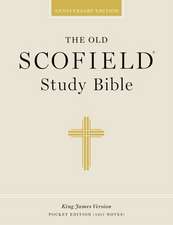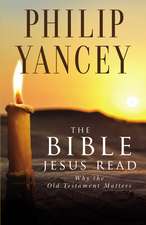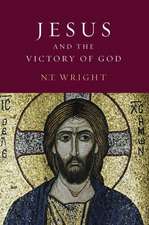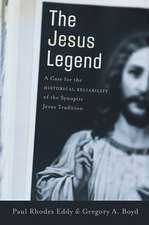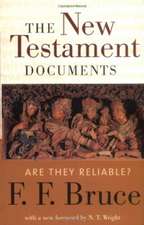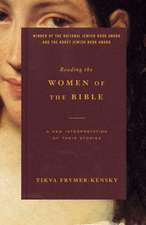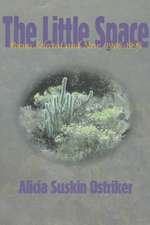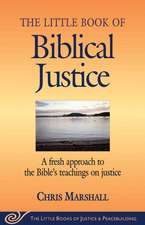The Nakedness of the Fathers: Biblical Visions and Revisions
Autor Alicia Suskin Ostrikeren Paperback – mar 1997
Like much twentieth-century feminist writing today, this book crosses the boundaries of genre. Biblical interpretation combines with fantasy, autobiography, and poetry. Politics joins with eroticism. Irreverence coexists with a yearning for the sacred. Scholarship contends with heresy. Most excitingly, the author continues and extends the tradition of arguing with God that commences in the Bible itself and continues now, as it has for centuries, to animate Jewish writing. The difference here is that the voice that debates with God is a woman's.
In her introduction, "Entering the Tents, " Ostriker defines the need to struggle against a tradition in which women have been silenced and disempowered - and to recover the female power buried beneath the surface of the biblical texts. In "The Garden, " she reinterprets the mythically complex stories of Creation. Then she considers the stories of "The Fathers, " from Abraham and Isaac to Moses, David, and Solomon - and their wives, mothers, and sisters. In "The Return of the Mothers, " she begins with a radical new interpretation of the book of Esther, includes a meditation on the silenced wife of Job and the idea of justice, and concludes with a fable on the death of God and a prayer to the Shekhinah, the feminine aspect of God. Ostriker refuses to dismiss the Bible as meaningless to women. Instead, in this angry, eloquent, visionary book, she attempts to recover what is genuinely sacred in these sacred texts.
In her introduction, "Entering the Tents, " Ostriker defines the need to struggle against a tradition in which women have been silenced and disempowered - and to recover the female power buried beneath the surface of the biblical texts. In "The Garden, " she reinterprets the mythically complex stories of Creation. Then she considers the stories of "The Fathers, " from Abraham and Isaac to Moses, David, and Solomon - and their wives, mothers, and sisters. In "The Return of the Mothers, " she begins with a radical new interpretation of the book of Esther, includes a meditation on the silenced wife of Job and the idea of justice, and concludes with a fable on the death of God and a prayer to the Shekhinah, the feminine aspect of God. Ostriker refuses to dismiss the Bible as meaningless to women. Instead, in this angry, eloquent, visionary book, she attempts to recover what is genuinely sacred in these sacred texts.
Preț: 263.68 lei
Nou
Puncte Express: 396
Preț estimativ în valută:
50.46€ • 52.86$ • 41.82£
50.46€ • 52.86$ • 41.82£
Carte tipărită la comandă
Livrare economică 08-22 aprilie
Preluare comenzi: 021 569.72.76
Specificații
ISBN-13: 9780813524474
ISBN-10: 0813524474
Pagini: 282
Dimensiuni: 152 x 229 x 20 mm
Greutate: 0.44 kg
Ediția:None
Editura: Rutgers University Press
Colecția Rutgers University Press
ISBN-10: 0813524474
Pagini: 282
Dimensiuni: 152 x 229 x 20 mm
Greutate: 0.44 kg
Ediția:None
Editura: Rutgers University Press
Colecția Rutgers University Press
Notă biografică
Alicia Suskin Ostriker is the author of eight books of poetry, including The Imaginary Lover, which won the 1986 William Carlos Williams Award from the Poetry Society of America and The Crack in Everything, a 1996 nominee for the National Book Award. Her most recent book of prose is Feminist Revision and the Bible. She teaches English and creative writing at Rutgers University.
Cuprins
1. Entering the tents
In the beginning the being
Entering the tents
2. As in myth: The Garden
The Garden
Creation
The brothers
Survival
The father's nakedness
The rainbow
3. Myth into legend: The fathers I
The bosom of Abraham
Sarah, or defiance
The opinion of Hagar
The cave
Isaac, or laughter
The opinion of the ram
Rebecca's way
Jacob, or the man of touch
The sisters
Rachel solo
The interpretation of dreams. 4. Legend into history: The fathers II
The nursing father
The songs of Miriam
The opinion of Aaron
History: A Midrash on Sinai
The Sabbath: Mystery against history
The story of Joshua
Judges, or disasters of war
The redeeming of Ruth
Hannah, or sons and lovers
David the king
The wisdom of Solomon
5. Though she delay: The return of the mothers
Esther, or the world turned upside down
Job, or a meditation on justice
Tree of life
Intensive care
A prayer to the Shekhinah
In the beginning the being
Entering the tents
2. As in myth: The Garden
The Garden
Creation
The brothers
Survival
The father's nakedness
The rainbow
3. Myth into legend: The fathers I
The bosom of Abraham
Sarah, or defiance
The opinion of Hagar
The cave
Isaac, or laughter
The opinion of the ram
Rebecca's way
Jacob, or the man of touch
The sisters
Rachel solo
The interpretation of dreams. 4. Legend into history: The fathers II
The nursing father
The songs of Miriam
The opinion of Aaron
History: A Midrash on Sinai
The Sabbath: Mystery against history
The story of Joshua
Judges, or disasters of war
The redeeming of Ruth
Hannah, or sons and lovers
David the king
The wisdom of Solomon
5. Though she delay: The return of the mothers
Esther, or the world turned upside down
Job, or a meditation on justice
Tree of life
Intensive care
A prayer to the Shekhinah
Recenzii
Alicia Ostriker combines her talents as poet, essayist, and literary critic in this witty and profound meditation on key narratives of the Hebrew Bible. . . .It is vital reading for anyone concerned with contemporary women's reimagining of the sacred.
All of us who are women poets, idol breakers, and revisionists . . . feel a deep kinship to the work of Alicia Ostriker, and a debt as well.
Transgressive, devout, poetic, bawdy, Ostriker's book executes a Jewish feminist's contradance with tradition and makes of it an ecstatic celebration.
The Nakedness of the Fathers belongs on the bookshelf of Jewish feminists beside Plaskow's Standing Again at Sinai.
An imaginative and spiritual dialogue with characters and narratives of the Old Testament.
Descriere
Like much twentieth-century feminist writing today, this book crosses the boundaries of genre. Biblical interpretation combines with fantasy, autobiography, and poetry. Politics joins with eroticism. Irreverence coexists with a yearning for the sacred. Scholarship contends with heresy. Most excitingly, the author continues and extends the tradition of arguing with God that commences in the Bible itself and continues now, as it has for centuries, to animate Jewish writing
